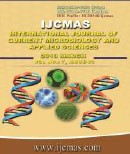


 National Academy of Agricultural Sciences (NAAS)
National Academy of Agricultural Sciences (NAAS)

|
PRINT ISSN : 2319-7692
Online ISSN : 2319-7706 Issues : 12 per year Publisher : Excellent Publishers Email : editorijcmas@gmail.com / submit@ijcmas.com Editor-in-chief: Dr.M.Prakash Index Copernicus ICV 2018: 95.39 NAAS RATING 2020: 5.38 |
Soil contamination as part of land degradation is caused by the presence of xenobiotic chemicals or other alteration in the natural soil environment. It is typically caused by industrial activity, agricultural chemicals or improper disposal of waste. Rhizobiales, belonging to the alphaproteobacteria, are Gram- negative bacteria of agronomic importance because some species form nitrogen fixing symbiotic relationships with leguminous plants. Recently, rhizobia have been demonstrated to be available for the elimination of various types of organic pollutants from the environment, ranging from aromatic to linear hydrocarbons, chlorinated compounds, phenolic compounds, pesticides, and others. The genus Rhizobium was one of the most abundant members of the degrading microcosm in dibenzofuran contaminated soil. However, the bacterial catabolic enzymes and the pathways involved in the degradation of these compounds are only partially known. In addition to organic compounds, rhizobia have also been shown to have the potential to be a powerful tool for heavy metal bioremediation.
 |
 |
 |
 |
 |